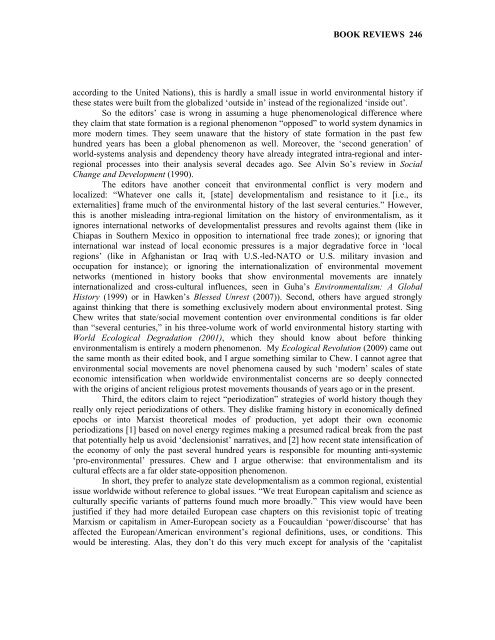Entire Volume 17 issue 1 - Journal of World-Systems Research ...
Entire Volume 17 issue 1 - Journal of World-Systems Research ...
Entire Volume 17 issue 1 - Journal of World-Systems Research ...
You also want an ePaper? Increase the reach of your titles
YUMPU automatically turns print PDFs into web optimized ePapers that Google loves.
BOOK REVIEWS 246<br />
according to the United Nations), this is hardly a small <strong>issue</strong> in world environmental history if<br />
these states were built from the globalized ‘outside in’ instead <strong>of</strong> the regionalized ‘inside out’.<br />
So the editors’ case is wrong in assuming a huge phenomenological difference where<br />
they claim that state formation is a regional phenomenon “opposed” to world system dynamics in<br />
more modern times. They seem unaware that the history <strong>of</strong> state formation in the past few<br />
hundred years has been a global phenomenon as well. Moreover, the ‘second generation’ <strong>of</strong><br />
world-systems analysis and dependency theory have already integrated intra-regional and interregional<br />
processes into their analysis several decades ago. See Alvin So’s review in Social<br />
Change and Development (1990).<br />
The editors have another conceit that environmental conflict is very modern and<br />
localized: “Whatever one calls it, [state] developmentalism and resistance to it [i.e., its<br />
externalities] frame much <strong>of</strong> the environmental history <strong>of</strong> the last several centuries.” However,<br />
this is another misleading intra-regional limitation on the history <strong>of</strong> environmentalism, as it<br />
ignores international networks <strong>of</strong> developmentalist pressures and revolts against them (like in<br />
Chiapas in Southern Mexico in opposition to international free trade zones); or ignoring that<br />
international war instead <strong>of</strong> local economic pressures is a major degradative force in ‘local<br />
regions’ (like in Afghanistan or Iraq with U.S.-led-NATO or U.S. military invasion and<br />
occupation for instance); or ignoring the internationalization <strong>of</strong> environmental movement<br />
networks (mentioned in history books that show environmental movements are innately<br />
internationalized and cross-cultural influences, seen in Guha’s Environmentalism: A Global<br />
History (1999) or in Hawken’s Blessed Unrest (2007)). Second, others have argued strongly<br />
against thinking that there is something exclusively modern about environmental protest. Sing<br />
Chew writes that state/social movement contention over environmental conditions is far older<br />
than “several centuries,” in his three-volume work <strong>of</strong> world environmental history starting with<br />
<strong>World</strong> Ecological Degradation (2001), which they should know about before thinking<br />
environmentalism is entirely a modern phenomenon. My Ecological Revolution (2009) came out<br />
the same month as their edited book, and I argue something similar to Chew. I cannot agree that<br />
environmental social movements are novel phenomena caused by such ‘modern’ scales <strong>of</strong> state<br />
economic intensification when worldwide environmentalist concerns are so deeply connected<br />
with the origins <strong>of</strong> ancient religious protest movements thousands <strong>of</strong> years ago or in the present.<br />
Third, the editors claim to reject “periodization” strategies <strong>of</strong> world history though they<br />
really only reject periodizations <strong>of</strong> others. They dislike framing history in economically defined<br />
epochs or into Marxist theoretical modes <strong>of</strong> production, yet adopt their own economic<br />
periodizations [1] based on novel energy regimes making a presumed radical break from the past<br />
that potentially help us avoid ‘declensionist’ narratives, and [2] how recent state intensification <strong>of</strong><br />
the economy <strong>of</strong> only the past several hundred years is responsible for mounting anti-systemic<br />
‘pro-environmental’ pressures. Chew and I argue otherwise: that environmentalism and its<br />
cultural effects are a far older state-opposition phenomenon.<br />
In short, they prefer to analyze state developmentalism as a common regional, existential<br />
<strong>issue</strong> worldwide without reference to global <strong>issue</strong>s. “We treat European capitalism and science as<br />
culturally specific variants <strong>of</strong> patterns found much more broadly.” This view would have been<br />
justified if they had more detailed European case chapters on this revisionist topic <strong>of</strong> treating<br />
Marxism or capitalism in Amer-European society as a Foucauldian ‘power/discourse’ that has<br />
affected the European/American environment’s regional definitions, uses, or conditions. This<br />
would be interesting. Alas, they don’t do this very much except for analysis <strong>of</strong> the ‘capitalist





